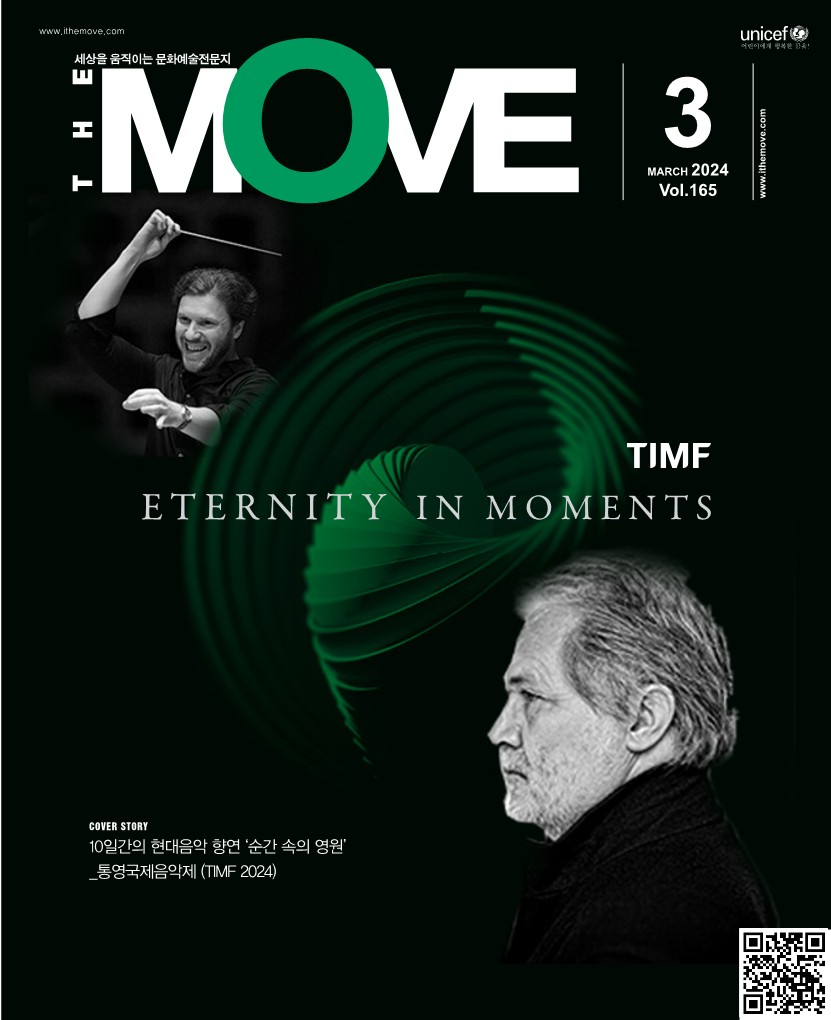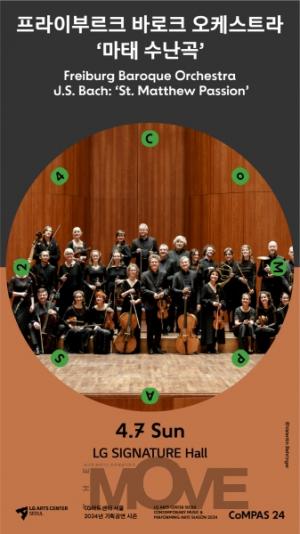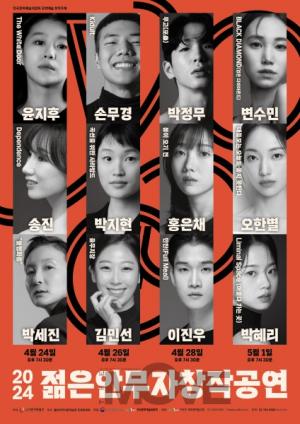- : Berlin with contemporary music from South Korea
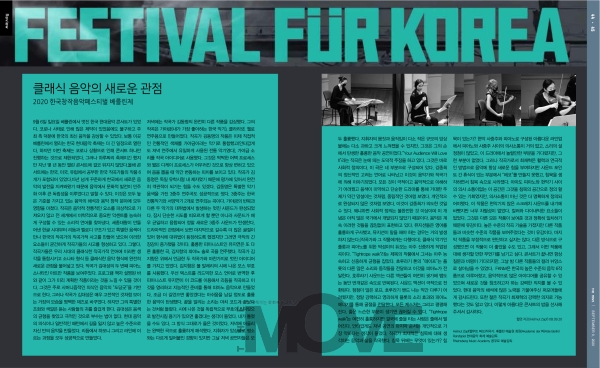 |
9월 6일 일요일 베를린에서 멋진 한국 현대음악 콘서트가 있었다. 코로나 사태로 인해 많은 제약이 있었음에도 불구하고 주최 측 덕분에 한국의 최신 음악을 감상할 수 있었다. 보통 이곳 베를린에서 열리는 한국 현대음악 축제는 더 긴 일정으로 열린다. 하지만 이번 축제는 코로나 상황으로 인해 콘서트 하나만 진행하는 것으로 제한되었다.
그러나 하루짜리 축제이긴 했지만 지난 몇 년 동안 열린 콘서트에 결코 뒤지지 않았다.
올해 콘서트에는 한국, 미국, 유럽에서 공부한 한국 작곡가들의 작품 6개가 포함되어 있었다.
15년 넘게 꾸준하게 한국에서 새로운 음악의 발전을 지켜봐왔기 때문에 음악에서 문화적 발전이 민주화 이후 큰 독립성을 이루었다고 말할 수 있다. 이것은 모두 높은 기준을 가지고 있는 음악의 해석과 음악 창작 분야에 모두 영향을 미쳤다. 작곡은 음악적 전통적인 요소를 피상적으로 가져오지 않고 전 세계에서 미학적으로 중요한 악센트를 능숙하게 구성할 수 있는 소리적 언어를 찾아냈다. 세종대왕이 만들어낸 한글 시대부터 리듬과 멜로디 구조가 있고 특별한 음색이 만나 한국의 작곡가의 작곡가적 사고를 만들어 냈으며 이러한 요소들이 굳건하게 작곡가들의 사고를 형성하고 있다. 그렇다. 작곡가들은 우리 시대의 클래식한 작곡가적 언어에 이러한 생각을 통합시키고 소나타 형식 등 클래식한 음악 형식에 완전히 새로운 관점을 불어넣고 있다.
작곡가 김대성의 두 번째 피아노 소나타인 아트만 작품을 보여주었다. 프로그램 책자 설명된 바와 같이 그가 미리 계획한 작품이라는 것을 느낄 수 있을 것이다. 그것은 주로 샤머니즘적인 의식인 음악의 “도당굿”을 기반으로 한다. 그러나 작곡가 김대성은 매우 고전적인 것처럼 보이는 거장의 모습을 명백한 재즈로 바꾸었다. 하지만 그의 특별한 조화와 색깔은 듣는 사람들의 귀를 즐겁게 한다. 김대성은 음색의 균형을 찾았고 극적인 것으로 부수는 법이 없다. 현대 음악의 의식이나 일반적인 패턴에서 길을 잃지 않고 높은 수준으로 자신 만의 음악을 만들었다. 리듬에서 하모니 그리고 라인에 이르는 과정을 모두 성공적으로 만들었다.
저녁에는 작곡가 김동명의 완전히 다른 작품을 감상했다. 그의 작곡은 가야금(내가 가장 좋아하는 한국 악기), 클라리넷, 첼로 연주용으로 만들어졌다.
작곡가 김동명의 작품은 이제 직접적인 전통적인 색채를 가야금이라는 악기로 통합했고(안타깝게도 저녁 연주에서 유일하게 사용된 전통 악기였다), 가야금 소리를 작곡 아이디어로 사용했다. 그것은 딱딱한 어택 프로세스와 짧은 디케이 프로세스가 어우러진 것으로 항상 변하고 있으며 음을 뽑을 때 약간 변동하는 피치를 보이고 있다. 작곡가 김동명은 독일 유학시절 내 제자였기 때문에 평가에 있어서 완전히 객관적이 되기는 힘들 수도 있겠다. 김동명은 특별한 악기 음색을 가진 3중주 연주곡도 성공적으로 썼다. 3중주는 한국 전통악기와 서양악기 2개로 연주되는 곡이다. 가야금의 반복과 다른 두 악기의 대위법에서 발생하는 멋진 사운드가 완성되었다. 잠시 단순한 시도를 떠오르게 할 뿐만 아니라 사운드가 매우 균일하고 융합되어 정말 새로운 3중주 사운드가 탄생한다. 드라마적인 관점에서 보면 마지막으로 갈수록 더 많은 굴절이 있어 형식에 대위법이 등장하도록 했겠지만 그러면 극작의 긴장감이 증가했을 것이다.
훌륭한 피아니스트인 유지연은 또 다른 훌륭한 곡, 김지향의 피아노 솔로 곡을 연주했다. 작곡가 김지향은 위에서 언급한 두 작곡가와 마찬가지로 멋진 아이디어를 가지고 있었다. 김지향은 폴 발레리의 시에 나온 모스 부호를 사용했다. 우선 텍스트를 리드믹한 모스 언어로 번역한 후 피아니스트 유지연이 이 코드를 이용해서 리듬을 작곡하고 이것을 영리하고 지능적인 준비를 통해 피아노 음악으로 만들었다. 조금 더 길었으면 좋았겠다는 아쉬움을 남길 정도로 훌륭한 음악이 탄생했다. 끝을 알리는 소리는 마치 코드가 끝났다는 것처럼 들렸다. 시에 나온 것을 독립적으로 부호의 스피릿으로 발전시킬 용기가 있으면 좋겠다는 생각이 들었다. 내가 틀렸을 수도 있다. 그 방식 그대로가 옳은 것이었다. 저녁에 어울리는 완벽한 곡으로 훌륭하게 해석했다.
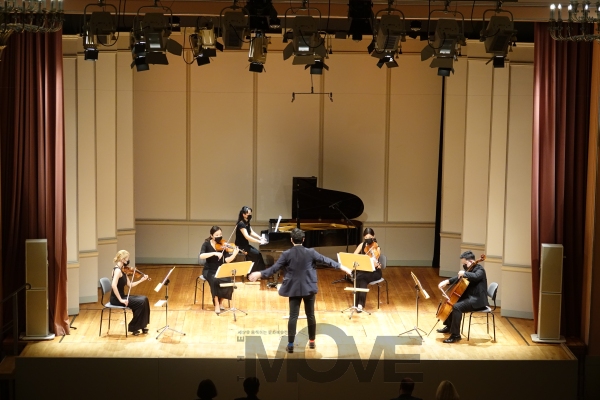 |
지휘자가 앙상블로 평소와는 다르게 밀어붙인 경향이 있지만 그날 저녁 공연자들은 모두 훌륭했다. 지휘자의 몸짓과 움직임이 다소 작은 규모의 앙상블에는 다소 과하고 크게 느껴졌을 수 있지만, 그것은 그의 손에서 탄생한 훌륭한 음악 공연이었다.
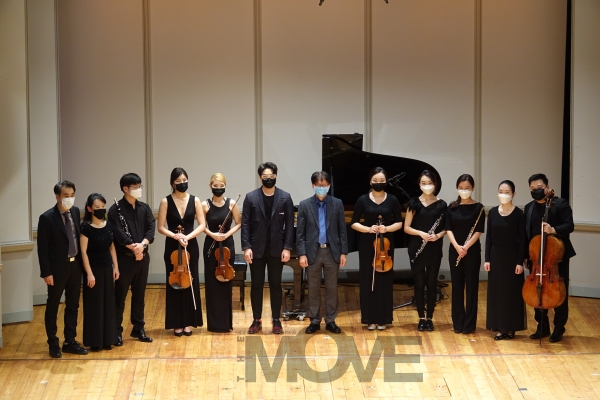 |
“Your Audience Will Love It”라는 작곡은 눈에 띄는 도덕적 주장을 하고 있다. 그것은 바로 사회적 정의이다. 이 곡은 네 부분으로 구성되어 있다. 강종희의 정신적인 고려는 언어로 나타났고 이것이 음악가와 작곡가에 의해 이야기되었다. 모든 것이 극적이고 음악적으로 이해하기 어려웠고 음색이 미약하고 단순한 드라마를 통해 거대한 주제가 약간 망설이는 것처럼, 중립적인 것어럼 보였다. 개인적으로 완성되지 않은 것처럼 보였다. 이것이 강종희가 의도한 것일 수 있다. 왜냐하면 사회적 정의는 불완전한 것 이상이며 이 개념은 아직 많은 국가에서 개발되지 않았기 때문이다. 음악은 계속 이러한 것들을 끊임없이 표현하고 있다. 뮤지션들은 영어를 훌륭하게 구사했고, 뮤지션이 말을 해야 하는 경우는 거의 발생하지 않는다.(작곡가와 그 작품에게는 다행이다).
클래식 악기인 플롯과 피아노를 위한 박성미의 듀오는 아주 신중하게 작업된 곡이다. “Tightrope walk"라는 제목의 작품에서 그녀는 아주 능숙하고 신중하게 균형을 잡았다. 호루라기 톤의 ”테이프“는 플롯의 다른 많은 소리와 동작들을 전달하고 이것을 피아노가 전달한다. 호루라기 사운드는 다른 액션들이 여전히 귓가에 맴도는 동안 번개같은 속도로 반복된다. 사운드 액션이 극적으로 전환된다.
점점더 많은 로프, 호루라기 밴드 나는 약간 다루기 어려웠지만, 정말 강력하고 영리하게 플롯의 소리 효과와 피아노 에너지를 통해 굴절을 전달한다. 모든 제스쳐는 그리고 평평해진다. 줄은 느슨한 부분이 생기면 끊어질 수 있다. “Tightrope walk"는 여전히 훌륭하지만 결국에 줄을 타는 사람은 줄에서 떨어진다.
안타깝게도 저녁 공연의 마지막 순서는 개인적으로 가장 약하다는 생각이 들었다. 작곡가 최재혁은 침묵에 대해 생각하는 음악과 삶을 작곡했다. 침묵 뒤에는 무엇이 있는가? 침묵이 있는가?
현악 사중주와 피아노로 구성된 아름다운 라인업에서 피아노와 사중주 사이의 의사소통이 거의 없고, 소리의 설정점이 많았고, 이 드라마에서 놀랄만한 부분을 기다렸지만, 그런 부분이 없었다. 그러나 작곡가로서 최재혁은 활력과 연극적인 방법으로 음악에 항상 새로운 힘을 부여하지만 사운드 포인트 간 휴식이 있는 부분에서 “에코”를 만들지 못했고, 침묵을 생각하면서 침묵 속으로 사라졌다.
아마도 피아노와 현악기 사이의 의사 소통이없는 이 공간은 그것을 침묵의 공간으로 정의 할 수 있는 기회였지만, 의사소통이 아닌 것은 더 명확하게 정의되어야했다. 이 작품은 현악기의 많은 스크래치 사운드를 내기에 바빴지만 너무 차별성이 없었다. 컬러와 다이내믹한 요소들이 없었다. 그것은 다른 모든 작품이 보여준 것과 정확히 일치하기 때문에 유감이다. 높은 수준의 작곡 기술을 가졌지만 다른 작품들과 비슷한 수준의 작품을 보여주었다는 것이 유감이다. 마지막 작품을 부정적으로 판단하고 싶지는 않다. 다른 방식으로 구성했으면 이 작품이 더 좋았을 수도 있고, 그래서 이번 작품에 대해 생각할 만한 무언가를 남기고 싶다. 콘서트가 끝나면 항상 질문과 비평이 기다리지만, 그날 밤 다른 작품들의 컬러 뉘앙스로 살아남을 수 있었다.
FKNM은 한국의 높은 수준의 음악 6작품으로 이루어졌고, 음악적으로 많은 아이디어를 공유할 수 있었으며 새로운 것을 창조하고자 하는 강력한 의지를 볼 수 있었다. 현대 음악의 해석에 많은 노력을 기울여주신 퍼포머들에게 감사드린다. 또한 젊은 작곡가 최재혁의 강력한 의지로 가능했다는 것도 알고 있다.
이렇게 아름다운 콘서트의 밤을 선사해주셔서 감사하다.
헬멋 자프(Helmut Zapf) 08.09.20
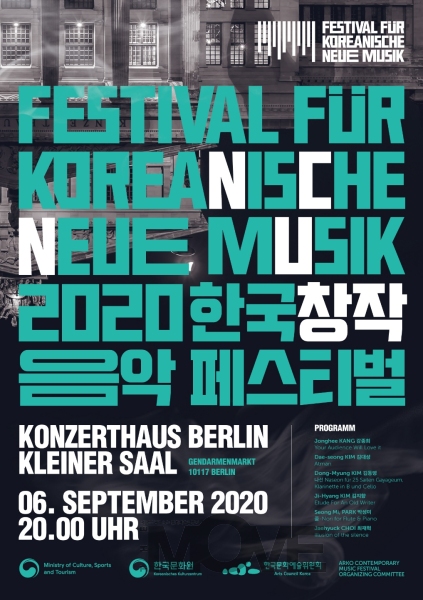 |
On Sunday, September 6th, there was a great concert in Berlin with contemporary music from South Korea. It is thanks to the organizers that the current presentation of the latest music from the free part of the Korean peninsula, the Republic of Korea, could be heard despite the restrictions caused by the Corona pantemy. Usually this festival here in Berlin with contemporary music from Korea is longer, has several days. This year the festival was limited to one concert because of the pantemy.
But it was not less interesting than the concerts in recent years, it was an "one-day festival, something especially.
The concert this year included six works by Korean composers who studied in South Korea, the USA and Europe.
Since I have been following the development of New Music in the Republic of Korea continuously for more than 15 years, I can say that the cultural development in the field of music has achieved enormous independence in the southern part of the peninsula after the democratization Has. This affects the area of interpretation as well as area of creation of music , both of them have a high standard. The composition has found its very own sound language, which does not take up the elements from its musical tradition superficially, but integrates them into "Classical Element" of Contemporary Music in such a way that it can skillfully set aesthetically important accents in the world. The music and instruments from the time of Hangeul, from the time of King Sejong, with their rhythmic, melodic structures and special tone-generation have found their way into the compositional thinking of the composers of this country, are firmly rooted in their thinking. Yes they bring it, integrate it into the current classical compositional language of our time and also bring classical forms of music, such as the form of the sonata in a whole new light:
That can show us the work of the composer Dae-seong KIM with his 2nd piano sonata, the sonata with the title ATMAN. You could feel that he had exactly pre-planned material, as he described in the program booklet, which is mainly based on the old shamanic ritual music "Dodangutt". But the composer formed a virtuoso spectacle that seemed very classicistic with apparent jazz phrases, but always he brought a very special harmony-color refraction to the ears of the listener with pleasure. The composer found the tonal balance and never crashed dramaturgically, he didn't get lost in any rituals or common patterns of Contemporary Music, he composed his own music on a high level. The process from rhythm to harmony and then to line, he succeeded very well.
A completely different piece on the evening was the work of the composer Dong-Myung Kim. His composition is written for Gayageum (my favorite Korean instrument), clarinet and violoncello.
Dong-Myung's composition has now integrated a direct traditional color into the instrumentation, the Gayageum (unfortunately it is the only traditionell instrument at this evening) and he takes the sound behavior of this instrument as a compositional idea for his work. It is the hard Attacc process and the short Decay process and the always slightly varying, fluctuating pitch when the notes are plucked on the instrument. Perhaps now I am not entirely free in the assessment, because Mr. Kim was also my student in Germany, but I try to remain objective: Kim succeeds in writing a trio which has an special own instrumental-timbre. It is generaded through the traditional Korean instrument and by the two instruments from the Occidental.The sound result is a wonderful rotating sound melody that arises from the repetitions of the Gayageum and the counterpoint of the other two instruments. This sound result doesn’t just remind you of an simple attempt for a moment, but its sound is so homogeneous and fused that a really new trio sound emerges. In terms of drama, I would have wished for more refractiones in the piece towards the end, so that a counterpoint would have arisen for the form, the dramaturgical tension would have increased.
The great piano player Ji Yeoun You she has played another great piece, the piano solo by Ji-Hyang KIM. The composer had a wonderful idea, like the other two composers mentioned above too. She used a Morse-Code from a poem by Paul Valery. The text was firstly translated into a rhythmic Morse language and then Ji-Yeoun used this code to compose rhythms and to emphasize them sonically through clever and intelligent preparations in the piano. A wonderful world of sound emerged that I would have liked to have wished for a little longer. The end sounded a bit like that: the code is over, the piece too ..., I would have liked the courage to develop the Spirit of this Code for a moment independently from poem..., but maybe I am wrong and it was just right how it was. So it was definitely a wonderful piece in this evening and it was wonderfully interpreted.
The performers that evening, they were all excellent, even the unconventional conductor pushed the matter good forward musically with the ensemble pieces, perhaps his gestures and movements were sometimes a bit strong and large for the small ensemble, the music would not have needed them but it was musical in his good hands.
The composition "YOUR AUDIENCE WILL LOVE IT" had a larger cast and also had it a high ethical claim. It was about SOCIAL JUSTICE. It was constructed in four parts. The mental considerations by Jonghee Kang for her piece brought she into the piece as language and were spoken by the musicians and conductor. That all remained dramatically and musically incomprehensible for me, the big topic remained rather hesitant and neutral with few tones and a simple drama, it seemed incomplete to me. Seen in this way, perhaps Jonghee Kang's intention, because social justice is more than just incomplete, it is very underdeveloped in many countries of the world, the music consistently expressed that. - The musicians spoke excellent and well-articulated English, which is very seldom the case with musicians when musicians has to speak (a stroke of luck for the composer and her work).
The duo by Seong Mi Park for flute and piano, a classical instrumentation, carefully worked out by her. "Tightrope walk" is her title for her piece, which she balanced skilfully and carefully: A "tape" of whistle tones transports many other sounds and actions of the flute, carried by the piano. The whistle sound shines through again and again at lightning speed while other actions are still in the ears. Extremly switching of sound actiones.
More and more the rope, the whistle band, becomes brittle for me..., although it is composed really intensely and cleverly the dramaturgy get a refraction by the the sound effects of the flute and by the energy of the piano, all gesters will some flat. The tightrope gets weak spots and could tears... . Still the "Tightrope walk" was great, but in the end the dancer falls off the rope ...
The last piece of the evening was, unfortunately, the weakest composition of the evening for me. Jaeyuck Choi, the realy good musical leader of this evening composed also an other great idea of music and life, thinking about silence: What is beyond silence, is there silence?
In this beautiful line-up with string quartet and piano, there was too little communication between the piano and the quartet, there were often set points of sound, I could wait for them no point was a surprice any more in the drama. But Jaeyuck Choi as conductor was in an exciting and theatrical manner and gave his music always new power, but during the breaks betwenn the sound points neither could they force the "echo" the retreat into silence thinking about the silence.
Perhaps the non-communication between piano and strings, this unfilled space was an opportunity to define it as a space of silence, but even then the non-communication should have been more clearly defined. The piece leaves many thoughts with me in retrospect: Why were the wonderful string instruments busy with so many scratchy sounds, which I actually like, but they were too undifferentiated, too less colors and too low dynamic gradation in the strings. It's pity because that's exactly what all the other pieces showed, a language of their own with a high level of composing technic. The last piece, I don't want to judge it negatov, maybe a different position in the concerto would have been better for the piece, maybe even as first, that could be a good place for this piece, because it wants to open something, ask something, provoke something . Questions and provocation can also be at the end of a concert, but then it has to be able to survive with the color nuances of the other works of the evening.
The result of this evening des FKNM is, all six pieces presented a great Korean evening of music on a high level, musically with a lot of ideas and a strong will to create new things. Great support from the performers whose mastered all the nuances of interpretation for contemporary music, it seemed to me. And I know this was also done by the strong will by the young conductor Jaeyuck Choi.
KAMSHAMNITA for this wonderful concert evening.
Helmut Zapf, 08.09.20
강영우 기자 press@ithemove.com

